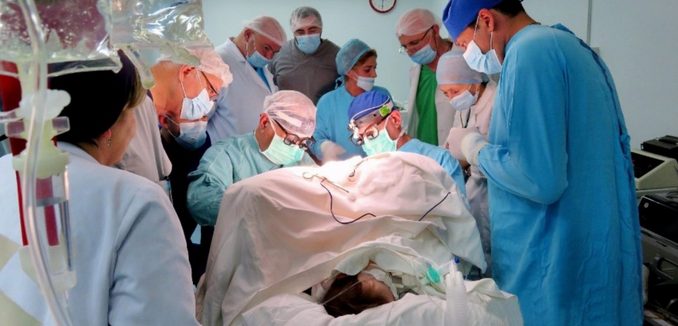A baby born without an esophagus and a five-year-old boy unable to eliminate bodily waste naturally were among the complex cases awaiting senior Israeli surgeons on their voluntary visits to Tbilisi, the capital of Georgia, at the crossroads of Europe and Asia.
“It gives us a chance to do something good for others. I don’t care if I treat a Georgian child or an Israeli child. I like to give good medical solutions to those who don’t have them,” says Dr. Ran Steinberg, director of pediatric surgery at Ruth Rappaport Children’s Hospital on the Rambam Health Care Campus in Haifa.
ISRAEL21c last wrote about Steinberg in September 2014, when he and his staff saved the life of a teenager from Gaza, giving him a kidney transplant and an improvised solution for poorly functioning blood vessels.
Steinberg leads a group of medical personnel from the Rambam pediatric intensive care and anesthesia departments, all working pro bono, twice a year, to perform complex medical procedures on children Tbilisi doctors have been unable to treat successfully. Air fare and accommodations for five days are provided by the Georgian government.
“This began as an initiative of the president of Georgia to encourage other countries to support medicine there,” Steinberg tells ISRAEL21c.
Israeli doctors have been participating for about 10 years, originally under the leadership of Dr. Itzhak Vinograd, then chief of pediatric surgery at Tel Aviv Sourasky Medical Center. When Vinograd was ready to retire five years ago, he asked Steinberg to be his successor.
“Over the years, the Rambam team has managed to treat a fairly large group of patients at the Georgian hospital and take advantage of their time in Tbilisi to examine past patients and monitor their condition,” says Steinberg.
On the latest visit to Givi Zhvania Children’s Hospital in Tbilisi last month, Steinberg’s delegation included head of intensive care Dr. Josef Ben-Ari, head of pediatric anesthesiology Dr. Amit Lehavi, and director of minimally invasive pediatric surgery Dr. Arkadi Vachian, who was raised in Tbilisi and moved to Israel as a young doctor.
This was Vachian’s fourth trip with the Rambam group. “For him to come to Tbilisi as a specialist who speaks the language is very moving for him and for us,” says Steinberg.
As soon as they arrive, the Israelis evaluate 30 children chosen by the Georgian doctors and decide who can be treated immediately and who needs further tests and imaging.
“We operated on 14 children this time; the others we postponed for next time,” says Steinberg.
In between visits, the Israeli and Georgian physicians are in constant contact about past, present and future cases. Steinberg calls it a “unique cooperative project” distinguished from one-off medical missions.
The Israelis not only treat the children but also teach their Georgian peers advanced surgical techniques as well as updated methods for pre- and postop management.
“We have continuity of care for the children and a good personal and professional connection with the Georgian doctors,” says Steinberg.
“We’ve become like family. You should see us hugging in the airport when we arrive! We hang out together at night and talk about medicine and life.”
Because they are dealing with such difficult cases, the Israeli doctors can’t always guarantee success.
For example, on the most recent trip they were presented with a little boy born with a perforated anus. Surgery performed in another Georgian hospital had left him incontinent, and his parents were desperate to relieve him of the need for colostomy bags.
“We tried to reconstruct his anus and it was really challenging; we don’t yet know the long-term results. These are complicated cases sometimes treated by doctors without the proper knowledge,” says Steinberg.
A past patient was a baby whose stomach had to be raised to his chest to construct an esophagus. “It was a complex procedure and a long recovery, but it worked very well. Unfortunately, he died of a bowel obstruction four or five months later. This was a frustrating case that shows the complexity of treating patients overseas,” says Steinberg.
Nevertheless, most of the little patients do get well thanks to the expertise of the Israeli physicians and the efforts of their Georgian counterparts.
“It’s always challenging to do something different as a surgeon. In the end we become better surgeons,” says Steinberg, who in 2014 opened the Pediatric Kidney Transplantation Unit at Ruth Rappaport Children’s Hospital and serves on the National Trauma and National Children’s Health Committees and the Israeli Transplantation Association.
During the November visit, the Israelis established a collaboration among Rambam Health Care Campus, the Technion-Israel Institute of Technology (whose medical school is affiliated with Rambam) and Tbilisi State Medical University.
(via Israel21c)
[Photo: Israel21c ]




